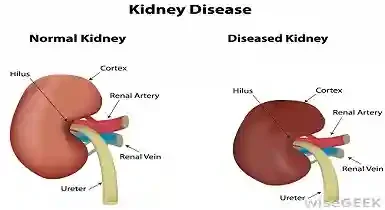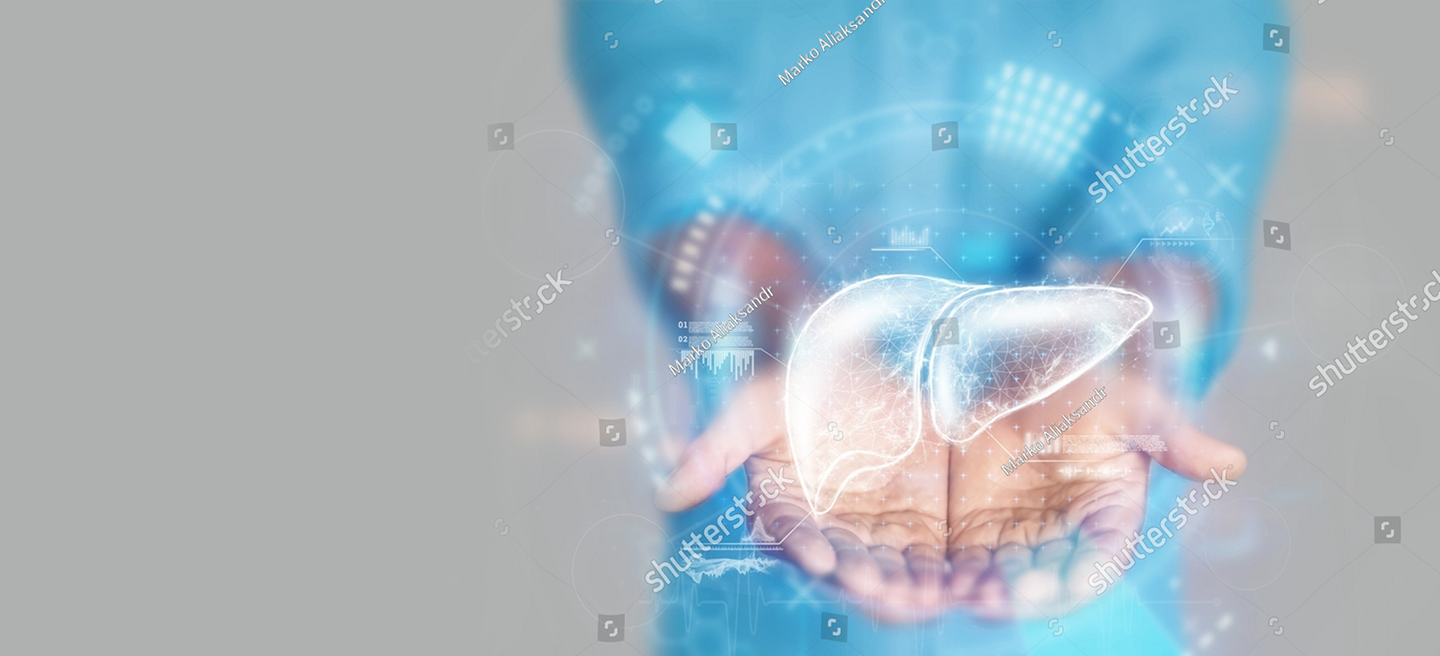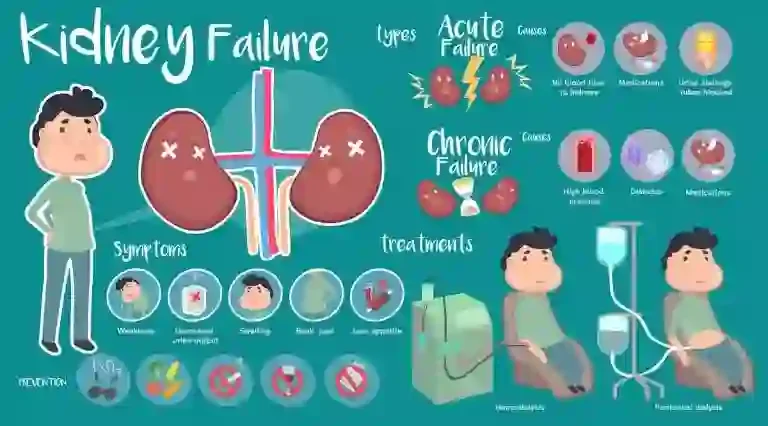Kidneys are important organs that filter fluid and waste from your blood, and you cannot survive without them. Diseases that affect your kidneys’ ability to clean your blood can damage just your kidneys or impact other organs of your body. These medical problems can lead to chronic kidney disease or kidney failure.
Some of the Types of Kidney Diseases
Kidney diseases can be classified into the following types:
Below are the types of kidney disease:
Chronic Kidney Disease (CKD)
It is characterised by gradual loss of kidney function over time. Often caused by conditions like high blood pressure, diabetes, or other diseases affecting the kidneys.
The most common form of kidney disease is chronic kidney disease caused by high blood pressure and diabetes. Kidney failure is the last (most severe) stage of chronic kidney disease. This called end-stage renal disease or ESRD for short. Other causes include, autoimmune diseases, such as lupus and IgA nephropathy, Genetic diseases, polycystic kidney disease, Nephrotic syndrome and Urinary tract problems.
Kidney Stones
It occurs when solid masses form in the kidneys from crystals that separate from urine. It can cause severe pain when passing through the urinary tract. Risk factors include dehydration, certain diets, and metabolic disorders.
Urinary Tract Infections (UTI)
Any portion of the urinary system might be the source of these bacterial diseases. Infections in the urethra and bladder are often the most prevalent, and they do not result in health issues because their medical care is simple. However, kidney failure can result from these infections if they are not treated in time.
Polycystic Kidney Disease
It can be referred to as an inherited medical condition that leads to several kidney cysts. These cysts ultimately lead to kidney failure because they affect the normal functioning of a human kidney.
Glomerulonephritis
The inflammation of glomeruli is the condition known as Glomerulonephritis. These small structures in the kidneys are blood-filtering agents. The most prominent causes include congenital malformations, drugs and infections.
Causes of Kidney Disease
Causes of Acute Kidney Disease: Acute renal failure or acute kidney damage are medical terms used to describe when the kidneys suddenly stop functioning. The primary reasons are:
- Suffer a severe injury that results in blood loss, such as being in a car accident.
- If you are dehydrated or your muscles get broken due to an injury, the excessive release of toxic proteins in your blood will stress and damage your kidneys.
- Go into shock because you have sepsis, a serious infection.
- Develop hypertension and some other pregnancy-related complications such as Eclampsia.
- Acute kidney damage can also result from autoimmune diseases, which are conditions where your body’s immune system attacks you.
- Have kidney stones or an enlarged prostate that obstructs you from urinating.
- Certain drugs or exposure to particular poisonous substances that are nephrotoxic
- Acute renal failure is pretty common in patients with severe liver failure or cardiac decompensation.
Causes of Chronic Kidney Disease: The medical term for kidney failure, which lasts longer than three months, is chronic kidney failure.
- The common causes are high blood pressure and diabetes (Types 1 & 2).
- Through birth defects, the kidneys are damaged or cause occlusion of the urinary tract. Of the common ones is a sort of valve that links the urethra and bladder.
- The irreversible damage to kidneys may arise from the long-term use of some medications, including NSAIDs and Naproxen, as well as IV illicit drugs, lead poisoning and so on.
- You may develop chronic kidney disease due to increased alcohol use. The chances of having hypertension, which might lead to kidney disease, may occur if you consume two drinks every day.
Symptoms of Kidney Disease
Your kidneys are quite flexible. Some of the issues that might arise from having a kidney problem can be addressed by them. Thus, if your kidney impairment worsens gradually, your symptoms will also gradually become apparent. In fact, symptoms can not appear until the disease has progressed. Below are the symptoms of kidney disease:
- Increased blood pressure
- Vomiting and nausea
- Fatigue and weakness
- Appetite loss
- A metallic aftertaste
- Having trouble thinking
- Problems sleeping
- Cramps and spasms in the muscles
- Swelling in the ankles and feet
- Uncontrollable itching
- Chest pain occurs in the event that fluid accumulates around the heart’s lining
- Breathing difficulties if a buildup of fluid occurs in the lungs
Kidney Stone Treatment
Kidney stones are often treated by doctors according to the size, location, and kind of the stone. If you don’t get treated, little kidney stones could pass through your urine system. Serious medical attention may be required for larger kidney stones, kidney stones that obstruct your urinary tract, or kidney stones that pain a lot. You might need to visit the hospital and obtain fluids via an IV if you are vomiting and dehydrated.
Invasive treatment is not usually necessary for small kidney stones. You might be able to pass a little stone by:
- Drinking 2 to 3 quarts (1.8 to 3.6 litres) per day can dilute your urine and may help prevent stones from developing.
- A little stone might be uncomfortable to pass. Your doctor can suggest using ibuprofen or other pain relievers to treat minor discomfort.
- To assist in removing your kidney stone, your doctor could prescribe an alpha-blocker. This kind of drug helps you pass the kidney stone faster and with less discomfort by relaxing the muscles in your ureter.
Removal of Kidney Stones
More intensive therapy may be necessary for large kidney stones that are difficult to pass naturally or that result in bleeding, kidney damage, or persistent UTIs. Using the following procedures, a urologist can either remove the kidney stone(s) or break them up into smaller pieces:
- Shock Wave Lithotripsy: With shock wave lithotripsy, the doctor can fracture a kidney stone into small fragments, which easily pass out in the urine. The fragments of the smaller parts from your kidney stone move via the urine system.
- Cystoscopy and Ureteroscopy: A cystoscope is used by a doctor to look inside your bladder and urethra during the process of cystoscopy with the aim of checking for stones. With a ureteroscopy, the physician can take detailed pictures by using an instrument called a Ureteroscope, which is thinner and longer than a cystoscope.
- Percutaneous Nephrolithotomy: The location of the kidney stone is evaluated by a doctor utilising a nephroscope, which normally happens to be quite a narrow-viewing instrument. A physician places the instrument right into your kidney through a small incision on your back. The doctor may also use a laser to shatter the larger kidney stones into small pieces.
Importance of the Kidney and its Functions
- The kidneys are two bean-shaped organs situated in the back muscles (on either side of the spine) of the upper abdominal cavity in our body.
- The main function of the kidney is to filter the blood circulating through your body by removing waste and excess salts and regulate the water fluid levels.
- They are also responsible for regulating pH, salt, and potassium levels in the body.
- Produce hormones that regulate blood pressure and control the production of red blood cells.
- Activate a form of vitamin D that helps the body absorb calcium.
FAQs on Types of Kidney Disease
Q. How many types of kidneys are there?
The kidneys are divided into two types: the left and right kidney. The kidneys are among the most important organs, and they serve as filters to eliminate waste from the bloodstream and regulate fluid balance in the body.












